Lesson Three: The Viability of Liberal Values in Today's World
| Site: | MoodleHUB.ca 🍁 |
| Course: | Social 30-2 RVS |
| Book: | Lesson Three: The Viability of Liberal Values in Today's World |
| Printed by: | Guest user |
| Date: | Tuesday, 23 December 2025, 7:34 PM |
1. Introduction
The Viability of Liberalism in Today's World
Issue Question: Are the values of liberalism viable?
Duration: 2 blocks (80 mins each + homework)
Liberalism, like any ideology, has critics as well as supporters and faces challenges today. This lesson will help you explore liberalism in today's world and the extent to which citizens or governments might embrace it when faced with different issues. There are different aspects to this exploration: Please proceed to the lesson to help you answer those important questions.
2
2. Lesson 6.3.1 When Should Liberal Values be Restricted?
When Should Liberal Values be Restricted?
Remember the key liberal values of individualism and liberalism that stress self-interest and self-reliance along with individual rights and freedoms. These liberal values promote individuals maintaining their independence to satisfy their own wants and needs by relying on themselves to act in their own best interests. Above all, government involvement in the affairs of society should be limited. Government should get involved in society for only the following things:
-
Security - Individuals should be kept safe through law enforcement by the police and there should be a military to keep people safe from external threats (that is, attacks from other countries).
-
Protection of Rights and Freedoms - Individual rights and freedoms, including private property, should be protected and guaranteed by the government.
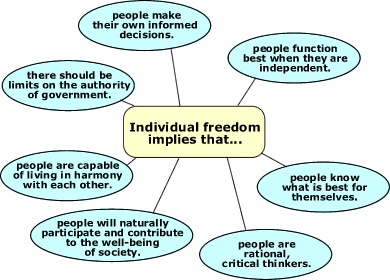
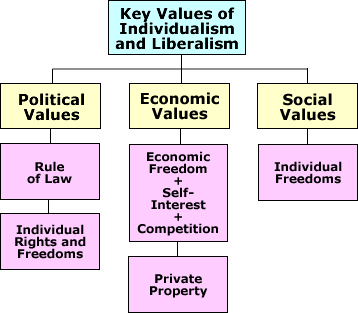
Liberal Democracies
Understanding that, if a society adopted a true liberal ideology, there would be no laws, no rules is important. This state of extreme freedom is called anarchy, which is the absence or failure of government that results usually in disorder and chaos.
In theory, anarchy would work if each individual respected the people around them and made decisions to support the common good, but history has shown that this does not happen. One of the biggest dilemmas confronting liberal ideology is to find ways to be fair to everyone while finding the balance between individual freedom and government control.
Liberal Thinkers
Liberal thinkers understand the need for government laws restricting individual freedoms to some extent. They understand that rules and laws are set by governing bodies to help maintain peace and order in society. Liberal democracies are committed to liberal ideology, but can a society become too liberalized? Can liberalization make individuals too free?
John Stuart Mill, an early advocate of modern liberalism, considered this issue with his statement on the Harm Principle. This principle states that the government should make laws only to prevent people from doing harm to other people. In all other areas, the government must not restrict personal freedom. Government can restrict people by law only if the action violates someone else's rights. Government cannot make people do something, even if it would make them happier or better people or wiser.
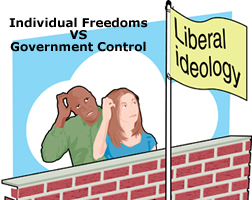
The Freedom vs. Control Debate
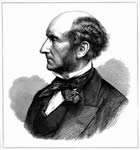
John Stuart Mill
Modern liberals use laws and other methods to control some economic, social, and political activities to maintain the stability of the government and to maintain a balance between freedom and control. Commitment to liberalism requires finding
a balance between individual rights and freedoms and the common good. If individual freedoms interfere with the common good, should government interfere by limiting those freedoms? If the order of society is threatened, should government be able to
limit severely or even take away individual freedoms?
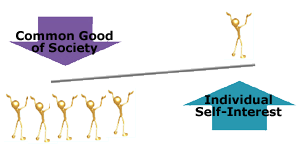
Just how capable of being effective (viable) are liberal values when confronted by issues in today's world? Following are examples of liberal democratic governments limiting individual rights and freedoms
Liberal Democracies Limit Citizens' Rights
Canada:
War Measures Act
Emergencies Act
Anti-Terrorism Act
Security Certificates
The United States:
Patriot Act
Racial Profiling
3. Lesson 6. 3.2 Issues Challenging the Viability of Modern Liberalism
Historical Context
Since the birth of liberalism people have challenged the fundamental beliefs and values of it. Review this powerpoint to understand the how and why.
Current Issues Challenging the Viability of Liberalism
Liberalism promotes individual rights and freedoms while limiting government powers. However, is liberalism justified when sometimes those rights and freedoms can cause harm to others? Liberal democratic societies are challenged constantly by issues that call into question whether individual rights and freedoms should be restricted or, at the very least, limited to some extent.Just how capable of being effective (viable) are liberal values when dealing with current issues? Following are examples of current challenges for liberal values
Poverty and debt
Environment and resources
Internet and censorship
Health crisis
These examples are explained in the following reading in your textbook. Are the values of liberalism viable? OR, in other words, Are liberal values capable of handling current issues effectively?
 |
Read "Challenges to Liberalism" on pages 374-389 of your textbook, Understandings of Ideology. These pages will further your understanding of the concept of the viability of liberal values in today's world. You should make notes, either on paper or on your computer, about what you have read. |
|---|
4. Conclusion
Today, the challenges of issues related to poverty, debt, environmental concerns, resource use and development, Internet censorship, and health crises can force societies to reconsider or limit the application of liberal values. Examples of poverty and wealth, including homelessness, debt and housing crises, and decisions about environmental issues and their possible impacts can influence how we feel about the extent to which liberalism is viable today. The key questions are whether moderate self-interest- rather than selfishness or altruism- can address these challenges to liberalism and what roles governments and citizens should play in doing so.